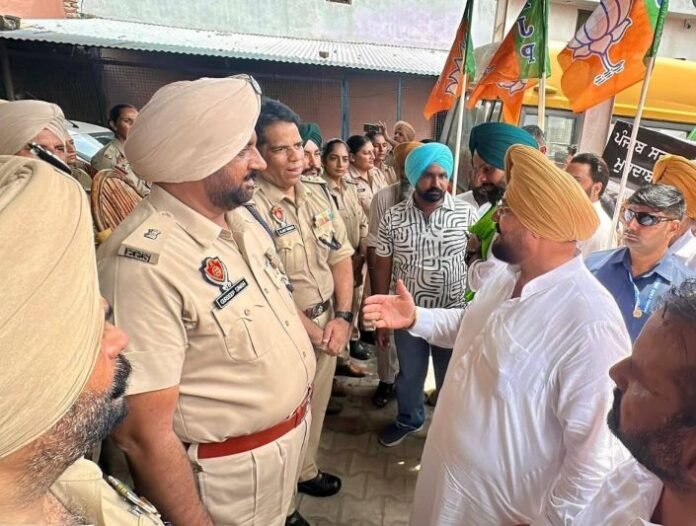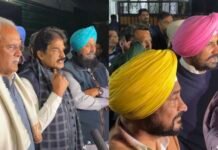Saptrishi Soni: Punjab is in the midst of a fierce political and social storm, as the state’s long-standing National Food Security Act (NFSA) ration beneficiary list finds itself at the center of a high-profile dispute between the ruling Aam Aadmi Party (AAP) and its main rival, the Bharatiya Janata Party (BJP). In the days leading to August 25, 2025, the controversy escalated rapidly, with police actions against BJP-supported welfare camps crystallizing the battle lines in districts across the state.
Ration Row: Why Punjab’s Food Security Became a Political Minefield
The ration row began with dramatic swings in the number of qualifying beneficiaries receiving subsidized food grains in Punjab. When AAP swept to power in March 2022, the state listed around 1.43 crore persons under NFSA. Yet by early 2023, this had jumped to 1.57 crore—well above the Centre’s official quota of 1.41 crore. The sudden spike prompted both the Centre and state authorities to initiate a stringent verification process, culminating in the removal of nearly 13 lakh suspected ineligible names. This brought numbers down to the quota, only for 10.77 lakh to be reinstated ahead of general elections, taking the tally back up to 1.53 crore.As the Centre maintained pressure, it cited Supreme Court orders for mandatory e-KYC of ration card holders, arguing this would weed out false claims, including cases where families own four-wheelers, farm large tracts of land, or are listed as company directors. Punjab pushed back, seeking a six-month extension for verification—insisting that during this harvest season, administrative resources are stretched thin. Chief Minister Bhagwant Mann fiercely accused the BJP-led central government of “ration theft,” maintaining that bureaucratic hurdles and new eligibility criteria could deprive up to 55 lakh families of their food entitlements—a third of Punjab’s poor population.This row was further complicated by claims and counterclaims from both parties. While Mann insisted he would “not let a single kitchen go without food,” BJP leaders struck back, arguing AAP’s own inconsistent beneficiary audits excluded genuinely poor families while protecting party affiliates. The political temperature rose, with both sides accusing each other of creating chaos and undermining food security for Punjab’s vulnerable.Police Action Unfolds: BJP Welfare Camps Face Crackdown
The ration row soon spilled into the streets. Across districts, BJP volunteers began organizing pop-up welfare camps. Officially, these camps aimed to help residents understand e-KYC requirements and access central government benefit schemes. Unofficially, AAP leaders charged that BJP was using these camps to collect personal data and spread misinformation about ration entitlements. District administrations, echoing AAP concerns, ordered police investigations at several locations. As a result, police detained BJP functionaries, shut down multiple welfare camps, and seized data forms in places like Ludhiana, Bathinda, Jalandhar, and Amritsar.For the BJP, these detentions were a blatant attempt to silence grassroots outreach and political opposition. Punjab BJP Chief Sunil Jakhar declared the moves to be “an assault on democracy,” promising to continue direct engagement with voters and arguing that “the AAP government is scared of being exposed over ration cards and benefit exclusions.” The state government, meanwhile, justified police interventions as crucial to stopping “unlicensed data harvesting” and the spread of “fear among ration card holders.” Ultimately, these actions turned local welfare camps into ground zero for broader national confrontation.Citizens found themselves caught in the crossfire. Confused ration card holders flooded helplines and public offices, seeking clarity on their status and entitlements—especially with rumors swirling about imminent loss of food support. Civil society voices, including activists, urged both sides to focus on transparency and beneficiary protection rather than political one-upmanship. Broader Implications: Political Trust and Social Stability at Stake
What’s unfolding in Punjab touches more than food security. At heart, it’s become a bellwether for how administrative decisions, court-mandated audits, and political communication can collide and affect millions of ordinary lives. The state’s challenge now is to finish fair and transparent beneficiary verification, without losing sight of justice for those who truly rely on public assistance.
The grain-rich state’s angry rhetoric—punctuated by police-escorted evictions of welfare camps—shows just how explosive NFSA debates can get when both state and central governments see themselves as champions of the poor, but disagree on the rules. As the political row continues, families waiting for their monthly wheat—at ₹2/kg or free—are left to wonder whether the next round of audits, or the next welfare camp, will bring relief or more uncertainty.




